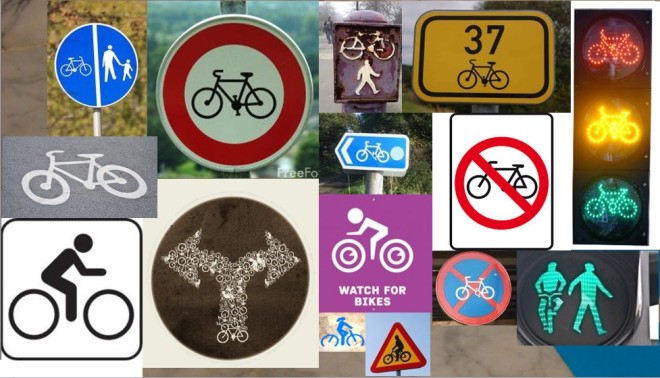
Revising your national highway code – aiming higher, or sinking fast?
2 European countries have just revised their traffic rules. One is strongly supported by cyclists' organisation whereas the other one is highly criticised. What makes the difference? Our Road Safety officer Ceri Woolsgrove draws you the picture.
Cycling is a perfect way to bring social and economic benefits to all Europe’s citizens. Most of the time cycling advocacy is all about positive issues, advocating for countries to share best practices from our highest performing countries. But sometimes ECF’s international voice has to help where well-meaning but poorly informed governments undermine cycling. We are in the middle of one of those situations right now. Germany and Spain have both revised their Road Codes, the national rules for traffic management.
The good news is that Germany has announced measures that improve infrastructure and free passage of cyclists which come in to force on April 1st. These changes should support positive trends in cycle use and the government’s ambition to see cycling grow as high as 20% of transport. ECF’s largest member group in Germany is ADFC and they have broadly welcomed the changes.
In particular the extensive revision of signs and symbols should make life easier for cyclists and for the city planners who want to help them. See ADFC’s briefing on the new rules here (in German) http://www.adfc.de/stvo
By comparison Spain lies close to the bottom of the European league table on almost all things cycling. 25th of 27 on transport, 24th on bike sales per head, 18th on tourism. There is huge room for growth, a 2008 study by the International Labor Organisation showed Spain could create 66,000 cycling-related jobs by 2020. But at this time of crisis the roads department has proposed some of the most anti-cycling measures ever seen in Europe, for example banning unaccompanied children from cycling and introducing compulsory cycle helmets, a measure known to reduce cycling.
This has been despite the evidence provided by not only the cyclists’ associations in Spain but also the bicycle industry and public bodies. In the last week the City Council of Seville approved a declaration signed by all groups against the project of the Spanish Traffic Authority for making cycle helmets mandatory in urban areas. This decision adds to the main Spanish leaders in the promotion of transport cycling which have approved similar declarations including Barcelona, Valencia, Zaragoza, Donostia - San Sebastián, and Burgos. The Spanish Network of more than 100 Spanish Cities "Cities for the bike" has also made a joint declaration.
Ceri Woolsgrove, Road Safety and Technical Policy Officer at ECF says “This is the side of our work we welcome least, despairing of all the resources everyone has to waste fighting these damaging proposals. The only positive outcome is the way it brings us together, other member groups writing to their local Spanish tourist boards and businesses addressing the Spanish trade ministry. “
As Jose Antonio Gomez, Director of bike manufacturer BH told ECF “When our government won’t listen to Spanish voices then it helps to have international associations to show them they are out of step with the rest of the world. We can’t do this alone, we don’t have strong cycling bodies like some other countries but with the help of our ECF friends and our trade associations EBMA and COLIBI we hope that the worst policies can be avoided now. Then we must work together to build cycling in Spain to the levels of our neighbours.”
Nobody imagines a relaxing holiday where road conditions are so bad the kids can’t play on the streets. Yet while Germany is looking forward the Spanish Government seems to be adopting an approach to cyclist safety that takes us back twenty or thirty years.
This is another reason why we need the EU to back higher standards of road safety for all its citizens and not allow some of them to be left behind by local failings. This should be something that we can agree upon right across Europe but local failings make it essential that the EU should be doing more in this area such as making 30kmph default for urban areas. Click here to go to the citizen’s petition asking the Commission to act.
Ceri Woolsgrove is the ECF Policy Officer for Road Safety & Technical Issues. He is from the UK and has worked extensively in London, Brighton, Liverpool (UK), Hang Zhou (China) and now in Brussels. His previous employment was for an organisation representing the transport industry in Brussels. Ceri has a Master’s degree in Globalization and International Policy Analysis from the University of Bath, and Social and Political Thought from the University of Sussex
- Log in to post comments
Contact the author
Recent news!
Upcoming events
Contact Us
Avenue des Arts, 7-8
Postal address: Rue de la Charité, 22
1210 Brussels, Belgium











